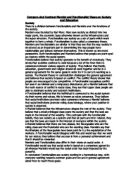Outline and assess the differences and similarities between the Functionalist and Marxist views on how society works.
Sociology has been classified as the last in a long line of emerging scientific disciplines, which people have developed and explored in order to make sense of their world. Indeed Comte, who actually invented the term ‘sociology’, had originally called the subject ‘social physics’. Sociology can also be seen as the most complex of all these disciplines, because it attempts to deal with such a broad and flexible subject – what Giddens summarizes as ‘human social life, groups and societies.’ Early theories such as the positivist approach of Comte, the Functionalist views of Emile Durkheim and the conflict perspectives of Karl Marx have each, in turn, attempted to offer a view of why human beings behave as they do, and how they fit together within societies.
Each theoretical approach has to some extent been shaped or influenced by the approach of others and many sociological perspectives display marked similarities, or a range of differences that can be traced to a reaction against previously held ideas. It is inevitable, and also desirable that such a broad subject as sociology should give rise to a variety of approaches: it would be impossible and also fruitless to categorise the vast amount of social change that has occurred over centuries by attempting to apply a single theoretical approach.
According to Browne. ‘Sociological perspectives centre on how much freedom or control the individual has to influence society.’ There are, as he asserts, two main approaches – structuralism and interpretivism. ‘Structuralism is concerned with the overall structure of society and the way social institutions …act as a constraint, or limit and control individual behaviour.’ Structuralism offers a view of the individual as being rather like a puppet, not as an autonomous entity, but as being controlled by the society in which they live As we shall see, although both Marx and Durkheim are similar in that they can both be described as structuralists, their vies on how society as a structure influences the individual are radically different.
Functionalism, or structural consensus, was developed as a concept by the French writer Emile Durkheim. He believed, like Comte on whose work he drew, that sociology should be viewed as a precise science, and that a sociologist should approach their work with an open mind (value freedom), and that society should be studied objectively. Durkheim placed great emphasis on ‘social facts’ which he saw as ‘ways of acting, thinking or feeling that are external to individuals and have their own reality outside the lives and perceptions of individual people.’ This is also known as the macro approach, and places a greater emphasis on the structure of society and detracts from the individual who operates within that society. To illustrate this viewpoint, Durkheim used the ‘organic analogy’ of the human body. In order for the whole (body) to flourish and prosper, all parts (organs) must work cooperatively and efficiently. The desirable end product would be, he argued, the body as the structure of society in perfect harmony – maintaining order and stability which would arise from the socialization of individuals into a value consensus. The ‘social facts’ on which Durkheim places such emphasis have what Giddens calls a ‘coercive power’ – they mould the individual. The Functionalist perspective has since often been criticized for what has been perceived as its failure to take into account the ‘dark side’ of society, and the theme of social deviance and isolation – for example functionalist writers such as Parsons project the image of the ‘cereal packet’ family and fail to account for the vast extent of family diversity and also abuse within the family. This has been attacked particularly by feminist sociologists who argue that far from being a harmonious unit, the family is a means of oppressing women.








